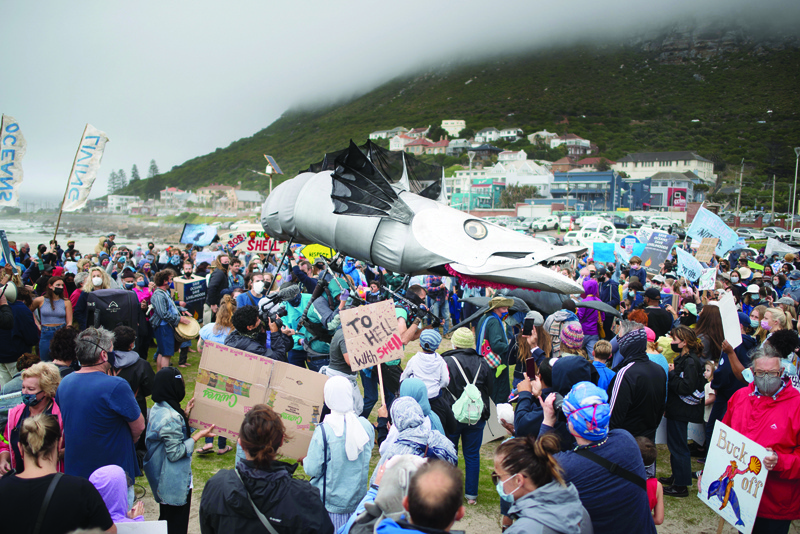 CAPE TOWN: A giant puppet of a Snoek, a type of common local Mackeral, is displayed as hundreds of people take part in a protest against the plan by Dutch oil company, Shell, to conduct underwater seismic surveys along South AfricaÕs East coast, at Muizenberg Beach, in Cape Town, yesterday.-AFP
CAPE TOWN: A giant puppet of a Snoek, a type of common local Mackeral, is displayed as hundreds of people take part in a protest against the plan by Dutch oil company, Shell, to conduct underwater seismic surveys along South AfricaÕs East coast, at Muizenberg Beach, in Cape Town, yesterday.-AFP
CAPE TOWN: Hundreds of environmentalist demonstrators gathered on South African beaches yesterday to protest against oil and gas exploration by energy giant Shell. In Cape Town protesters held up the peace symbol and brandished a giant model snoek fish to highlight their concerns about the potential impact of the project on sea life. Under a dull, rainy sky, protesters in Gqeberha waved signs showing a Shell logo altered to resemble a hand showing its middle finger and calling for a boycott of the group's petrol stations.
Activists say Shell's plans to search for oil and gas deposits off the beloved "Wild Coast" of eastern South Africa-a key tourist attraction-pose a danger to marine animals. Shell plans to use seismic waves emitted from boats equipped with air cannons to analyze the geological structure of the ocean floor, hunting for spots likely to contain hydrocarbons. Ecologists say the exploration technique could upset animals' behavior, feeding, reproduction and migration patterns, with many sea creatures such as whales relying heavily on their sense of hearing.
But a court on Friday rejected their request for an emergency injunction against Shell's plans. "In a time when all accepted science points towards us not using fossil fuels anymore, and our northern hemisphere neighbors are dead set against seismic surveys, I find it puzzling that these new 'colonizers' feel justified in moving their unwanted activities to Africa," said Alan Straton, a sailor and member of the Ocean Stewards development project.
The Wild Coast includes several nature reserves and protected marine areas stretching along some 300 kilometers (190 miles) of unspoiled Indian Ocean shoreline. Shell plans to spend four to five months exploring in the region over an area of 6,000 square kilometers. "We take great care to prevent or minimize impacts on fish, marine mammals and other wildlife," a company spokesman told AFP last month. - AFP

